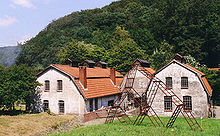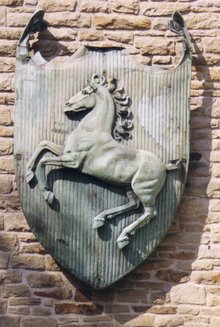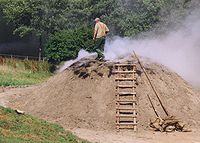
Hagen Westphalian Open-Air Museum
Encyclopedia


Hagen
Hagen is the 39th-largest city in Germany, located in the federal state of North Rhine-Westphalia. It is located on the eastern edge of the Ruhr area, 15 km south of Dortmund, where the rivers Lenne, Volme and Ennepe meet the river Ruhr...
neighbourhood of Eilpe in the Mäckingerbach valley in the eastern Ruhr area
Ruhr Area
The Ruhr, by German-speaking geographers and historians more accurately called Ruhr district or Ruhr region , is an urban area in North Rhine-Westphalia, Germany. With 4435 km² and a population of some 5.2 million , it is the largest urban agglomeration in Germany...
. The sponsor is the Landschaftsverband Westfalen-Lippe (Westfalen-Lippe Regional Authority).
The Hagen Westphalian Open-Air Museum brings a bit of skilled-trade history into the present, and it takes a hands-on approach.
On its grounds stretching for about 42 ha, not only are urban and rural trades simply "displayed" along with their workshops and tools, but in more than twenty of the nearly sixty rebuilt workshops, they are still practised, and interested visitors can, sometimes by themselves, take part in the production.
History

In 1960, the Hagen Westphalian Open-Air Museum was founded, and thirteen years later, the gates opened to the public. Unlike most open-air museums, which show everyday life on the farm
Farm
A farm is an area of land, or, for aquaculture, lake, river or sea, including various structures, devoted primarily to the practice of producing and managing food , fibres and, increasingly, fuel. It is the basic production facility in food production. Farms may be owned and operated by a single...
or in the country as it was in days gone by, the Hagen Westphalian Open-Air Museum puts the history of these activities in Westphalia
Westphalia
Westphalia is a region in Germany, centred on the cities of Arnsberg, Bielefeld, Dortmund, Minden and Münster.Westphalia is roughly the region between the rivers Rhine and Weser, located north and south of the Ruhr River. No exact definition of borders can be given, because the name "Westphalia"...
in the fore. From the late 18th century through the early years of the Industrial Revolution
Industrial Revolution
The Industrial Revolution was a period from the 18th to the 19th century where major changes in agriculture, manufacturing, mining, transportation, and technology had a profound effect on the social, economic and cultural conditions of the times...
to the highly industrialized society emerging in the early 20th century, the visitor can experience the development of these trades and the industry
Industry
Industry refers to the production of an economic good or service within an economy.-Industrial sectors:There are four key industrial economic sectors: the primary sector, largely raw material extraction industries such as mining and farming; the secondary sector, involving refining, construction,...
in the region.
Crafts and trades
Crafts and trades demonstrated at the Hagen Westphalian Open-Air Museum include ropeRope
A rope is a length of fibres, twisted or braided together to improve strength for pulling and connecting. It has tensile strength but is too flexible to provide compressive strength...
making, smithing
Blacksmith
A blacksmith is a person who creates objects from wrought iron or steel by forging the metal; that is, by using tools to hammer, bend, and cut...
, brewing
Brewing
Brewing is the production of beer through steeping a starch source in water and then fermenting with yeast. Brewing has taken place since around the 6th millennium BCE, and archeological evidence suggests that this technique was used in ancient Egypt...
, baking
Baking
Baking is the technique of prolonged cooking of food by dry heat acting by convection, and not by radiation, normally in an oven, but also in hot ashes, or on hot stones. It is primarily used for the preparation of bread, cakes, pastries and pies, tarts, quiches, cookies and crackers. Such items...
, tanning
Tanning
Tanning is the making of leather from the skins of animals which does not easily decompose. Traditionally, tanning used tannin, an acidic chemical compound from which the tanning process draws its name . Coloring may occur during tanning...
, printing
Printing
Printing is a process for reproducing text and image, typically with ink on paper using a printing press. It is often carried out as a large-scale industrial process, and is an essential part of publishing and transaction printing....
, milling
Mill (grinding)
A grinding mill is a unit operation designed to break a solid material into smaller pieces. There are many different types of grinding mills and many types of materials processed in them. Historically mills were powered by hand , working animal , wind or water...
, paper
Paper
Paper is a thin material mainly used for writing upon, printing upon, drawing or for packaging. It is produced by pressing together moist fibers, typically cellulose pulp derived from wood, rags or grasses, and drying them into flexible sheets....
making, and much more. A favourite attraction is the triphammer workshop shown in the image above. Once the hammer is engaged, a craftsman goes to work noisily forging a scythe
Scythe
A scythe is an agricultural hand tool for mowing grass, or reaping crops. It was largely replaced by horse-drawn and then tractor machinery, but is still used in some areas of Europe and Asia. The Grim Reaper is often depicted carrying or wielding a scythe...
, passing it between the hammer and the anvil underneath in a process called peening
Peening
Peening is the process of working a metal's surface to improve its material properties, usually by mechanical means such as hammer blows or by blasting with shot . Peening is normally a cold work process...
.
The Hagen Westphalian Open-Air Museum is open from March or April until October.
External links
- Museum's website
- Westfalen-Lippe Regional Authority
- Pictures of some of the museum's buildings
- More pictures Scroll down a bit; includes downloadable video clip of the triphammer mentioned above in operation.

